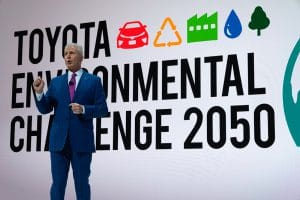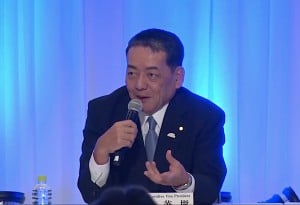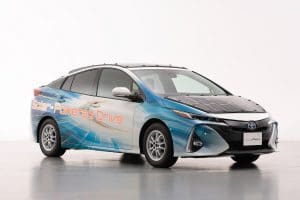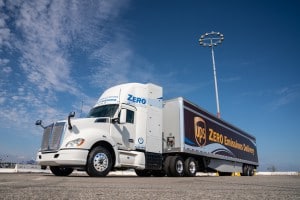
Toyota’s Jack Hollis said the automaker is proud of its history of environmentally friendly vehicles.
A new poll commissioned by environmental activists found that Toyota, which has long boasted about its environmentally friendly vehicles and practices, is finding its reputation taking a beating after siding with the Trump administration on fuel economy standards.
“Auto manufacturers depend on brand loyalty, and Toyota has built a reputation as a forward-looking, environmentally minded company,” said Dave Cooke, senior vehicles analyst at the Union of Concerned Scientists, which has long advocated for tighter fuel economy standards and other environmentally friendly policies.
“Toyota’s actions undermining strong vehicle standards stand in direct opposition to that branding, and what this poll shows is that Toyota is putting the loyalty of their customer base at serious risk. This is a powerful argument for Toyota to change course and act in an environmentally responsible way, as the vast majority of their customers expect them to ensure that their green reputation is backed up by action,” he added.
(EPA, NHTSA submit final fuel economy proposals to Trump)
Toyota officials declined an opportunity to comment.
General Motors Co. and Fiat Chrysler Automobiles N.V. also endorsed the Trump administration position, which pitted them against the tougher standards advocated by the State of California. However, both GM and FCA traditionally attacked tougher environmental rules and regulations on a broad range of issues.

Toyota Motor Co. CEO Akio Toyota laid out the company’s plans for its new “city” near Mount Fuji, part of its environmentally friendly efforts.
Both companies only changed their tune and supported tighter standards after they went bankrupt and the government aid they needed came with the condition they not try to block the tighter standards imposed by the Obama administration, which worked closely California.
Toyota, however, always has tried to separate itself from the hard-nosed, anti-regulatory and environment approach used throughout the years by Detroit’s carmakers and portray itself as more environmentally friendly.
The approach appears to have hit a speed bump, according to the poll commission by the Union of Concerned Scientists.
The UCS found Toyota’s failure to support strong vehicle emissions standards results in a nearly one-third decline in the company’s favorability among existing Toyota owners. The UCS poll also indicated that Toyota’s customers – regardless of party affiliation – believe strongly that Toyota should support strong vehicle emissions standards.
Additionally, due to the company’s support for an October 2019 lawsuit to oppose states’ authority to adopt stronger emissions standards, four in 10 loyal Toyota drivers could consider switching brands.
The poll found Toyota’s failure to support strong vehicle emissions standards results in the company’s favorability falling from 98% to 66%, a decline of about one-third. Seventy-five percent of Republicans and 90% of Democrats who own Toyota vehicles think Toyota should support stronger emissions standards designed to help the environment and improve gas mileage.
(California moves to block Trump fuel efficiency standard)
In addition, 63% of Toyota owners surveyed became less supportive of Toyota’s decision to join the October 2019 lawsuit once informed that average emissions and fuel efficiency of the company’s vehicle fleet actually got worse over the last several years. As detailed in a 2017 Automotive Trends Report, Toyota was the only vehicle manufacturer whose emissions and fuel efficiency rates declined from 2012-2017.
Also hearing about the lawsuit, younger Toyota owners ages 18–34 are the most likely to initially consider purchasing from a different manufacturer in the future.

Toyota EVP Shegeki Terashi discusses the automaker’s plans to accelerate its BEV program with the media, as it looks to make up for lost time.
Reversing course and opposing the lawsuit attacking state authority to set strong vehicle pollution standards would improve Toyota’s reputation among Toyota vehicle owners 72%, according to the poll’s findings.
Ford, BMW, Volkswagen and Honda signed an agreement last summer to support the California standards, which are based on the state’s long-standing right to impose its own, separate standards on carmakers.
In a bid to expand federal power, however, the Trump administration is suing California to block its separate standards. Several other states also use the California standards. A new article in The New Yorker magazine revealed the Trump administration labeled the automaker’s support for the new standards as a “publicity stunt.”
Meanwhile, a new study by Consumer Reports has found that the rollback of the fuel-economy standard would cost consumers $300 billon.
Consumer Reports Manager of Cars & Energy Policy Shannon Baker-Branstetter said, “The leaked details appear to show that the administration is dead-set on this rollback despite the strong evidence that it will cost American drivers billion more in the fuel costs.
“While the administration’s own numbers appear to show a net loss from the rule on the order of $34 billion to $41 billion, it’s likely that this is an underestimate of the losses, due to past flaws that have plagued the administration’s calculations and modeling throughout this entire process.”
(Trump confirms mileage standards cut, elimination of California clean air waiver)
Weakening the requirements would Increase fuel costs per average new vehicle by $3,200, according to Consumer Reports figures. The only beneficiary of the policy would be the oil industry, the magazine said.



I would think that this poll is nonsense. Ask Hillary.
Actually, Todd, not to get into politics, if you actually check the 2016 polls, the traditional, trustworthy ones nailed it. No, they expected, for the large part a Clinton win, but they showed a margin of error that readily would have gone the other way. In fact, just a combined 50,000 votes in four states, well within the margin of error, and the election would have gone the other way. As it were, Clinton did win the popular vote by a large margin, but in a system relying on an electoral college, only a slim number of votes can determine the outcome, even against what the majority vote would yield otherwise.
Paul E.